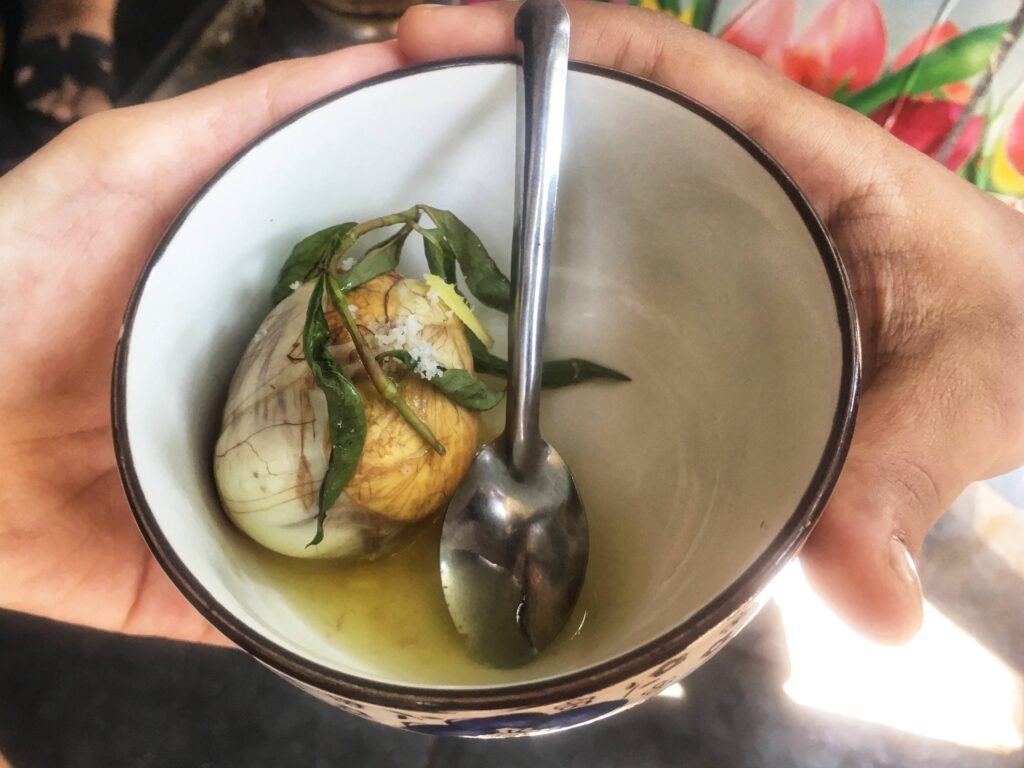Balut is one of the most popular street foods in the Philippines. Served as a late night snack, it’s similar to hotdogs in the US.
The egg is made from fertilized duck eggs that are kept warm for a period of time. Once they develop an embryo inside, they are boiled and become balut.
Overview of Balut as a Food Source
Balut is a common food source in Southeast Asia. It is consumed in high quantities in countries such as Laos, Cambodia, Vietnam, and the Philippines.
Its popularity in Asia mainly stems from its low cost and health benefits, which include protein, calcium, and vitamins C and E. While this is the case, it is important to note that the dish may also be a source of some health risks.
In the Philippines, balut became popular with workers and working-class families due to its cheapness. It was also a popular snack among night owls to help replenish their energy.
Culinary Uses and Traditional Dishes
Balut is a popular delicacy in many Asian countries. Similar preparations include maodan (in China), hot vit lon (Vietnam) and pong tea khon (Cambodia).
In the Philippines, balut is eaten in a traditional way that includes cracking off the narrow end of the egg shell. Then, the egg is seasoned with salt and vinegar. Then, it’s slurped into a hole in the shell.
This delicacy is often a late-night snack for Filipino workers and partygoers, served warm. Vendors roam neighborhoods or set up shop on sidewalks, hawking these ducky delicacies to the chant of “balooooooooot!”
Availability and Market Trends
Balut is a popular street food in the Philippines that has become an integral part of Filipino culture. It is a ready-to-eat snack that is affordable and nutritious.
It is a delicacy that is widely consumed in several Asian countries and has gained widespread patronage throughout the region. However, it is often criticized due to ethical concerns that arise when consuming the unhatched duck egg embryos.
These issues might have contributed to the decrease in popularity of balut, especially among Southeast Asians. In the Philippines, pollution has destroyed many of the duck farms that once provided the raw eggs needed for this dish.
Health Benefits and Concerns
Balut is a delicacy that’s been a staple in the Philippines for centuries. It’s an unhatched duck embryo that is boiled in water and served warm, similar to a hard-boiled egg.
It’s an adventurous snack that’s sure to get the attention of those with a taste for unusual foods, but it’s also a controversial one. For those who have a gag reflex or are offended by some forms of meat consumption, it may not be the best choice for you.
But if you’re the adventurous type, it’s worth a try because it’s nutritious and has 188 calories, 14 grams of protein and loads of Vitamin C for immune system support and beta-carotene for antioxidant power. Plus, it has a lot of calcium, iron and phosphorus which are good for bone health and blood pressure.
Sustainability Issues
Sustainable consumption and production patterns are a key to sustaining livelihoods for people today and future generations. They are also critical to achieving the SDGs, which aim to end poverty and hunger, protect the planet from climate change, and ensure access to clean water and energy.
Unsustainable patterns of agriculture result in deforestation, the loss of natural habitats, and biodiversity destruction. They are a major driver of climate change and are linked to pollution, including the runoff of toxic pesticides into fresh water, marine ecosystems and soil.
Despite the sustainability challenges, Balut is still an important part of Philippine culture and cuisine. Throughout the country, farmers and producers are finding ways to improve their practices so that they can continue to offer quality products to consumers.

